|
|
|
Sort Order |
|
|
|
Items / Page
|
|
|
|
|
|
|
| Srl | Item |
| 1 |
ID:
114562
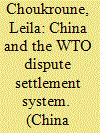

|
|
|
|
|
| Publication |
2012.
|
| Summary/Abstract |
Since its accession to the WTO on 11 December 2001, China has been involved in eight cases as complainant, 23 as respondent, and 89 as a third party. Against all pre-entry predictions, the China-related cases have not overburdened the WTO dispute settlement system, as if all parties were implicitly respecting a latent period before engaging in commercial hostilities. Often portrayed as a "passive rule taker" in the immediate aftermath of its accession, China was not only learning by attentively watching other members' strategies, but also benefiting from the benevolent attitude of its main trading partners, the US and the EU. Moreover, its participation in 89 WTO disputes as third party is not a trivial detail nor is it a sign of passivity, but rather one of cautious preparation that corresponded to the time needed to properly apprehend its new legal tools and all rights thereunder.
While there are many ways of approaching such an already vast body of decisions and related legal and economic literature, this article tries to reflect the uniqueness of the Chinese trade regime and the impact of such a peculiar mix between economic libreralisation and maintenance of the state on other WTO Members in addressing the following questions: the transitional product-specific safeguard measures adopted in reaction to a market disruption caused by Chinese imports, the antidumping and countervailing duties issue, and the restrictions on exportations or importations imposed by China for economic, but also societal and political reasons.
|
|
|
|
|
|
|
|
|
|
|
|
|
|
|
|
| 2 |
ID:
114563
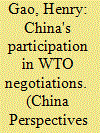

|
|
|
| 3 |
ID:
114557
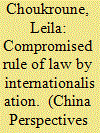

|
|
|
|
|
| Publication |
2012.
|
| Summary/Abstract |
Upon accession to the WTO, China committed to a series of specific obligations often referred to as "WTO+," aimed at the progressive transformation of the Chinese legal landscape. While one cannot ignore a number of very significant achievements as well as a true political responsiveness to other WTO members' concerns, China has not been willing to grasp the WTO opportunity for domestic legal reforms as much as observers, and some Chinese leaders, had hoped for. This incomplete normative revolution now creates tensions between WTO members, as evidenced by an increasing number of disputes shedding a direct light on the lack of transparency in the Chinese legal system. Ten years later, this piece reflects upon predictions about Chinese "rule of law by internationalisation," while putting China's legal reform into a broader political perspective.
|
|
|
|
|
|
|
|
|
|
|
|
|
|
|
|
| 4 |
ID:
114561
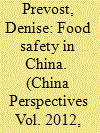

|
|
|
|
|
| Publication |
2012.
|
| Summary/Abstract |
The interaction between trade and health objectives has assumed critical importance for China since its accession to the World Trade Organization (WTO). The wish to improve its access to foreign markets has had a visible impact on China's food safety policy, providing significant impetus for far-reaching reforms. The WTO Agreement on Sanitary and Phytosanitary Measures (SPS Agreement), to which China is now bound as a WTO Member, sets out a "best practices" regulatory model with which national food safety regulation must comply. The disciplines it entails on regulatory autonomy in the area of food safety may present considerable challenges for China but have the potential to promote rationality in such regulation and to prevent food safety regulations that are based on unfounded fears or are a response to protectionist pressures from the domestic food industry. Faced with the possibility of challenges by other WTO Members to its food safety measures on the grounds of non-compliance with WTO rules, China has a strong incentive to improve conformity with this regulatory model, bringing benefits not only to exporters but most importantly to its citizens.
|
|
|
|
|
|
|
|
|
|
|
|
|
|
|
|
| 5 |
ID:
114560
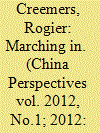

|
|
|
|
|
| Publication |
2012.
|
| Summary/Abstract |
This essay analyses the official and media response to the WTO cases related to cultural products, which China lost. It aims to contextualize both the official discourse and the press discourse in terms of domestic politics and China's trade priorities. It concludes that in the official discourse, China and the US are working at cross purposes, as they have fundamentally divergent concepts of trade in cultural products. The newspaper discourse is more moderate and emphasises developmental and commercial issues, but is also subject to the priorities of Chinese politics.
|
|
|
|
|
|
|
|
|
|
|
|
|
|
|
|
| 6 |
ID:
114559
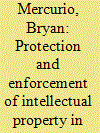

|
|
|
|
|
| Publication |
2012.
|
| Summary/Abstract |
China is without a doubt the world's leading infringer of intellectual property rights (IPRs). China's factories produce counterfeit and pirated products for local and foreign consumption while China's domestic industry infringes patent rights with relative impunity - this despite nearly 30 years of improving laws for the protection and enforcement of IPRs as well as accession to the World Trade Organization in 2001. This brief article seeks to understand the reasons behind China's apparent failure to adequately enforce its IPRs. Finding local protectionism a major impediment to enforcement efforts, the article further analyses whether the central government has the power to enforce IPRs or whether it is powerless to confront and challenge local interests.
|
|
|
|
|
|
|
|
|
|
|
|
|
|
|
|
| 7 |
ID:
114558
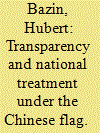

|
|
|
|
|
| Publication |
2012.
|
| Summary/Abstract |
Since 2001, China has, overall, respected the commitments it made when it joined the WTO. However, no "WTO spirit" has been observed that might have led it to go beyond the letter of these commitments, and very many non-tariff barriers are still in place. In view of the modernisation of its legal framework, is there room for improvements that would enable foreign companies to find their place more easily in a rapidly expanding market, or do structural obstacles stand in the way of the developments hoped for by its main partners?
|
|
|
|
|
|
|
|
|
|
|
|
|
|
|
|
|
|
|
|
|